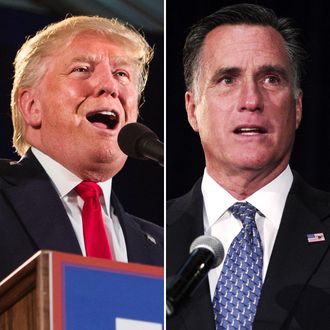
In a survey in February of this year on the political preferences of U.S. religious communities, the Pew Research Center identified the Church of Jesus Christ of Latter-day Saints as the most pro-Republican group of all, with 70 percent preferring the GOP to 19 percent for Democrats and 11 percent independent or “other.” The next-most-Republican group was Southern Baptists, at 64-26-10.
That’s why it’s more than passing strange that the putative nominee of the Republican Party has a well-established problem with this most-Republican faith community. As McKay Coppins (himself a Mormon) notes today, Trump did poorly among LDS folk in the Republican nominating contest, most especially in Utah, where he finished a poor third in the March 22 caucuses, behind John Kasich and Ted Cruz, who swept the state’s 4o delegates. And that’s no accident. Mormons value the kind of high moral standards Trump has never conspicuously displayed, and they also have a heavy investment in Latin American missionary activity that tends to make them strongly sympathetic toward immigration reform. With above-average incomes and education levels, LDS folk are not naturally drawn to right-wing “populism.” Perhaps most important, as a group with strong memories of being persecuted for their religious views, Mormons take a dim view of Trump’s Muslim-bashing.
Polls showing Hillary Clinton as competitive with Trump in Utah are the most shocking sign of Mormon distaste toward the mogul. But there’s more:
In an expansive Gallup report released last month, none of the 62 demographic groups surveyed were more ambivalent toward both presumptive nominees than Mormons were: Just 33 percent had a favorable view of Mr. Trump; for Mrs. Clinton, it was 21 percent. Such disillusionment could have consequences. The Mountain West has emerged as a general-election battleground in recent years, with explosive Latino growth and other demographic trends turning states that once leaned Republican, like Nevada and Colorado, into November tossups. And in the scrambled electoral map of 2016, Arizona looks increasingly as if it will be in play.
If Mormons stray from the GOP camp or don’t vote (and they normally vote at high rates), there could be consequences in all three of these states, where Mormons represent 3 to 6 percent of the population. What ultimately happens may depend on whether a credible conventionally conservative third-party or independent candidacy materializes. Yes, Libertarian Gary Johnson is an option for many, though his pro-choice and pro-drug-legalization views make him a less-than-ideal match for devout LDS believers. If, of course, Mitt Romney (who is conspicuously absent from the Trump bandwagon) were to publicly endorse another candidate or, better yet, allow his own name to appear on ballots in friendly states, Mormon defections from Trump could be substantial, and Utah could look genuinely shaky for the GOP. And that would be crazy.






























